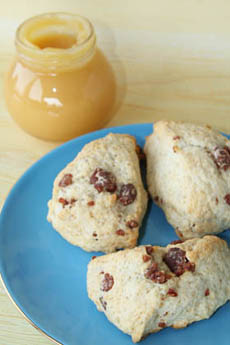TOP PICK OF THE WEEK: Iveta Cream Scones
 Moist, creamy Iveta Scones are a departure from the dry, traditional variety. These raspberry scones are among our favorites. |
Today’s scones are quick breads, similar to American biscuits. They are traditionally made with wheat flour, sugar, baking powder or baking soda, butter, milk and eggs, and baked in the oven—both in the traditional wedge form and in round, square and diamond shapes. We don’t enjoy traditional, hard, dry scones. They come from an earlier time, when cooking wasn’t as easy as it is today. The Scots, and others who enjoyed them back then, covered them with butter, jam (and more later, clotted cream), to take the edge off the dryness. But the cream scones from Iveta Scones—called cream scones because they substitute cream for the butter and eggs—are a moist delight that require no further embellishment (but go ahead—slather them with lemon curd and Devon cream). They’re available in 16 flavors plus sugar-free Vanilla. Read about our favorites—for even among a line that is uniformly delicious, there are standouts. Gift boxed and around $6.00, they make nice house gifts and—thinking ahead—stocking stuffers. Better yet, you can have delicious scones in 20 minutes, just by adding cream to the mix, shaping and baking. The scones also substitute for shortbread biscuits. |
|
|
While scones can be found in many flavors today—both sweet and savory—traditional English scones may include raisins or currants, but are often plain, relying on jam, preserves, lemon curd or honey for added flavor—perhaps with a touch of clotted cream. You may have heard two different pronunciations for “scone.” Which is the authentic one? They both are! The word is pronounced “skahn” in Scotland and Northern England (rhymes with gone) and “skoan” in the south of England (rhymes with own), the pronunciation adopted by the U.S. and Canada. Read more in the The History of Scones. You’ll also find the difference between clotted cream, Devon cream, and other scone mysteries. See more of our favorite scones and other bread products in the Bread Section of THE NIBBLE online magazine. Iveta Scones are a Nibble Top Pick Of The Week. Head to that review, or head to Iveta.com to buy some now.
|
||


